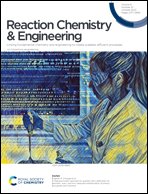Molybdenum sulfide-2D nanosheets offering multiple metallic sites enable different sugar epimerization reactions to rare sugars in water†
Abstract
In recent years, significant efforts have been made to formulate health-beneficial low-calorie sugars that can regulate the rising problems of lifestyle disorders, such as obesity and diabetes, in humans. These sugars can be produced through a chemical catalytic pathway. In this study, we report on the proficiency of as-synthesized molybdenum sulfide (MoS2) in the preparation of a variety of rare sugars. Analytical characterization indicates that the 2D nanosheets are largely composed of the 1T-MoS2 form, which can offer more metallic sites as Mo4+/Mo6+ and S2−. They exhibited varied binding affinity with sugars with respect to the structural configuration, resulting in varying end-products. For instance, during glucose epimerization, Mo could engage in a metal–glucose complex formation, thereby yielding mannose as high as 29% with 84% selectivity in water via a C1–C2 carbon shift pathway (Bílik mechanism), while sulfur, as a nucleophile, is involved in electron sharing with deficient Mo. Meanwhile in the fructose epimerization reaction, sulfur interacts and initiates an intra-molecular proton transfer (i.e., 1,4-hydride shift) when Mo undergoes a usual metal–fructose complexation, attributed to its electron source characteristics, resulting in an ∼26% L-sorbose formation with ∼50% selectivity. The recyclability study verified the stability of MoS2 accredited to a Mo–S covalent linkage. The results endorse the versatile characteristics of MoS2, therefore it can help in the large-scale and sustainable preparation of rare sugars (mannose, sorbose, allulose, and tagatose), whose production is currently undertaken via costly biotechnological methods, for commercial food and pharma applications.



 Please wait while we load your content...
Please wait while we load your content...